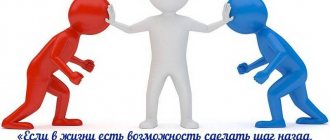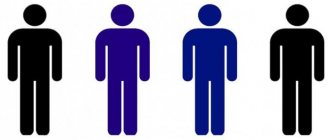Greetings, friends!
Every person knows and periodically uses the word “instinct”. For example, when explaining an unintentional action, we can say: “I did it instinctively.” However, many of us misunderstand what instinct is, with the result that the phrase often sounds like an inappropriate excuse. Today we will try to fill this gap and analyze in detail what instinct is. We will talk about the nature of this phenomenon, look at several examples and find out whether humans have instincts.
What is instinct?
Instinct is a pattern of behavior inherent at the genetic level, the purpose of which is to satisfy a specific need. Unlike a reflex, which is a single response to a specific stimulus, instinct implies a rather complex sequence of actions. All living beings have instincts aimed at solving such important problems as survival, food and procreation.
The term "instinct" comes from the modern Latin word instinctus, which has the same meaning. But the concept itself appeared earlier. Aristotle (4th century BC) suggested the existence of an “animal soul” that determines the behavior of animals. Later, the Athenian Stoic Chrysippus (3rd century BC) used the word ὁρμή (ormi) for this phenomenon, which became the equivalent of the word “instinct” in ancient Greek.
Instincts should not be confused with reflexes. The task of the reflex is to react in a timely manner to a specific stimulus. The task of instinct is to ensure that certain actions are carried out to ensure survival and procreation. Some instincts are common to all living organisms, while others are characteristic only of representatives of a certain species. The most complex instincts are observed in human behavior (the desire for power, recognition, social interaction, self-realization, self-development).
Many reputable psychologists denied the existence of instincts in human nature. Thus, Sigmund Freud believed that human romantic and sexual behavior is too complex to be explained by animal instincts (to explain this point of view, he developed the “Theory of Drives”). Abraham Maslow (the author of the hierarchical model of human needs) believed that people do not have instincts, since they, unlike animals, are able to restrain any impulses through willpower. According to Maslow, instincts in the human psyche are completely supplanted by thinking and replaced by emotions.
The biological meaning of instinct is to force an animal to perform a complex sequence of actions, some of which may be contrary to its current desires. Nevertheless, the animal carries out this “program,” thereby ensuring the survival of itself and its species. Instincts also manifest themselves in humans, but, unlike animals, he himself determines how he will act in order to realize the aspirations that arise in him. In other words, a person cannot control the activation of instinct, but is able to control its manifestation.
Human instincts
Instincts in people are activated at an unconscious level and at this stage they act in the same way as in animals. We feel them as desires, emotions and needs, but we have the opportunity to independently choose how to implement them. At the same time, the implementation of an instinct usually brings a feeling of satisfaction, while the inability to realize it causes severe emotional discomfort. Therefore, the claim that a person can control his instincts is wrong. It’s just that, unlike animals, he has more freedom in choosing the way to realize these instincts.
In essence, our instincts are the evolutionary experience of our ancestors, accumulated and transmitted in genetic memory. Some behavior patterns turned out to be more successful and provided increased vitality to individual individuals, due to which they were fixed in genes. For example, the formation of monogamous couples and joint care of children are embedded in us at the genetic level, since hundreds of thousands of years ago such behavior helped our ancestors to survive and successfully raise viable offspring.
4INSTINCT OF RESEARCH
From early childhood, people of this type are characterized by curiosity, a desire to get to the essence of everything, and a tendency to creativity. At first, these people are interested in everything, but then they become more and more captivated by one passion. Travelers, inventors, scientists are people of this type. Their credo is “Creativity and progress are above all.” The evolutionary feasibility of this type is obvious.
The research type is characterized by:
- propensity for research activities,
- a tendency to search for new, innovative things in science, art,
- the ability to leave a settled place and established business without hesitation when new, risky, but interesting things and tasks appear,
- aspiration for creativity,
- dedication in realizing creative aspirations.
Examples of instincts
As a first example, consider the most obvious instinct - the instinct of self-preservation. It is characteristic of all types of living beings. Even the simplest animals strive to escape from predators and any other dangers. Quite often this instinct manifests itself in the form of unreasonable fears. So many people are afraid of heights, instinctively trying to grab something tightly (like our ancestors grabbed branches and vines). Others are afraid of water, so they experience discomfort even while on board a large ship. This is also a manifestation of the instinct of self-preservation.
The second example is the instinct of procreation. All animals also have it, but it manifests itself more diversely than the previous one. In some animals it is limited to sexual intercourse, after some time after which the female lays eggs and abandons the clutch (as in some turtles). Other animals form pairs and raise offspring together, but then separate and form new pairs the following season. Many animals are monogamous (some to a much greater extent than humans).
As a third example, consider maternal instinct. It can be considered an independent phenomenon or part of the reproductive instinct. It is usually activated after the first pregnancy and can manifest itself not only in caring for one’s own offspring, but also in the desire to protect the weak. Maternal instinct is characteristic of both humans and almost all animals. There are many known cases where in zoos females of one species raise orphaned cubs of other species.
Classification of instincts
Human instincts are aimed at realizing the basic needs inherent to our species. The most important are 7 instincts:
- Self-preservation. This is a basic instinct that appears in all animals immediately after birth. The child cries so that he will not be left without attention. Growing up, he learns to distinguish dangers and avoid them. At the same time, he acts in accordance with his life experience, but the desire to avoid danger is instinctive.
- Continuation of the family. This instinct is just as important as the previous one, since its task is to ensure the preservation of the population. The reproductive behavior of animals of different species is very different, but in all cases it is due precisely to the instinct of procreation.
- Curiosity. Surely you have noticed that curiosity is characteristic of many animals. This is how the research instinct manifests itself. Dogs, cats, birds and even fish study with interest everything new and incomprehensible. This allows them to understand in advance which objects pose a danger and which may be useful.
- Dominance. The instinct of dominance exists in many animals, but in humans it is especially pronounced. Even if a person does not strive for power, he still wants to have influence on others, to be a “gray eminence.”
- The desire for freedom. This instinct manifests itself even in an infant who resists when they try to swaddle him. Growing up, the child violates the prohibitions of his parents. Even if the violation itself does not bring him anything, he rejoices in the fact that he satisfies his instinct for freedom.
- Adaptation. Any animal and person undergoes gradual adaptation to the environment and living conditions. The ability to adapt is also inherent in our nature on an instinctive level.
- Social communication. The communicative instinct makes us strive to communicate with other people, do business together and help each other.
Kinds
1. The most basic and basic thing is self-preservation
If for some reason it is not weakened, then your behavior will not be risky, gambling and destructive. For example, you will not climb into a cage with tigers, you will not jump without a parachute and provoke a group of athletes. Even at birth, a child unconsciously reaches out to his mother, experiencing great anxiety if he is left alone, because his life depends on others. That is why babies begin to smile so early, rejoicing at the approach of someone who cares, so that the desire to be picked up and approached to the crib more often does not fade away.
2.Procreation
It also begins to appear in childhood, in a feeling of happiness when the whole family is together, and the child subconsciously “reads” any conflicts, no matter how adults try to hide the discord. Then he begins to make himself felt in his desire to create his own separate family, give birth to a baby and take care of him. Hypertrophied when a person engages in promiscuity, along with indifference to his safety. Or weakly expressed when there is no desire to have heirs, devoting time and energy to other interests and desires.
3.Altruism
The first two reflexes were the main ones that help a person survive. Now let's move on to more social ones, ensuring socialization and successful activities. And the first will be altruism, which is expressed in caring for others, both people and animals, this is compassion and empathy, the desire for peace and goodness. When it is strongly expressed, a person is able to devote his life to caring for those who need it, but not just devote it, but make a sacrifice, for example, by going to a monastery.
4.Research
Aimed at developing a person, both creatively and in other areas. Thanks to curiosity, young children learn about the world, and depending on the environment in which they grow up, their abilities and aspirations develop. Examples of successful research activities for which they were not punished, but encouraged, are great scientists, travelers, famous creative personalities and other people following their interest.
5.Dominance
This is the need for leadership and power. People who have a pronounced dominance are able to lead a crowd, organize and manage. Have you noticed that even in the company of small children there is always a “ringleader”? No group can do without a leader, even an indirect one. It often happens that a person who has previously had no leadership experience, finding himself in a company in which power has not yet been distributed, takes the honorable place of leader. And it doesn’t matter in what way, either he wins the championship himself, or is chosen by the other participants.
6. Maintaining your dignity
Only in an exaggerated form people sometimes ignore their innate instincts. For example, they are ready to risk their health and life in order to defend their honor or rightness. When the level is very weak, then a person has low self-esteem, as a result of which he allows not only humiliation towards himself, but also violence. There are often cases when a self-confident woman begins a relationship with a tyrant who constantly devalues her, bringing her to such a state that she really stops believing in her strength, intelligence and attractiveness. He becomes a victim who is now easy to manipulate and control, because he will endure everything.
7.Freedom and independence
It appears in infancy, when trying to swaddle a newborn, during normal development. During rebellion in adolescence, if it is not suppressed. Thanks to the need for freedom, a person develops social skills, increases the likelihood of success, creating a family and, in general, a high-quality independent life. A person is able to bear responsibility and rely on himself, as he has experience.
Differences between instincts and reflexes
To better understand what instinct is, it is important to correctly understand how it differs from a reflex. The fundamental difference is that a reflex is a reaction of the nervous system that occurs immediately in response to a certain stimulus. Some reflexes can be restrained by willpower, but most of them are not under the control of our mind and will. There are two types of reflexes:
- Unconditioned reflexes. They are also called “congenital” or “specific”. They are embedded in genes and are characteristic of all individuals of one biological species. They manifest themselves regardless of life experience.
- Conditioned reflexes. They are also called “worked out”. They are formed during life to ensure a quick response to positive and negative environmental factors. If a conditioned reflex loses its relevance, it weakens and may disappear completely.
Despite significant differences, unconditioned and conditioned reflexes have a common nature and approximately the same trigger mechanism. The nerve impulse received from the receptor passes along the reflex arc and excites the systems (muscles or glands) that provide a response. All reflexes occur automatically and without awareness, and their cause is always some kind of irritant.
Unlike reflexes, instinct is a complex pattern of behavior that is not limited to the activation of a specific muscle or the secretion of a gland. Instinct can be compared to a trigger mechanism, the activation of which launches a complex program of actions. In this case, the program can be very conditional. Instinct arises as a strong need that requires satisfaction. And how exactly to satisfy it depends on the animal or person.
Personality as a result of learning
Gamers have only one instinct - the autosave instinct.
Knowing that you are controlled by your own mind and are not a shellfish is important, first of all, for analyzing your own life.
You can no longer say the following phrases:
- I was born this way!
- I have such a character!
- That's the kind of person I am!
Because everything that you are now is the result of the work of your mind.
Moreover, you cannot even complain that you were not taught something. Yes, they didn’t teach you as a child, but now no one is stopping you from learning.
Therefore, if something doesn’t work out for you, then the answer is simple - learn how to do it.
- If you don't have enough money, learn how to make money.
- If you don't have friends, learn to make friends.
- If you don't have happiness, learn to be happy.
In all these cases, the best assistant is your mind.
A mollusk may complain about life, but you cannot. After all, you can change it!
| Want to get your finances in order? If you are constantly short of money, then I recommend taking my most popular course “The ABC of money: what you need to know about money so that you can have it” See the course description at the link: https://sheremetev.aoserver.ru/?r=ac&id=6381&lg=ru
If you want to get a simple step-by-step method for increasing money in your wallet, then order the “ABC of Money” course using the link below: https://sheremetev.aoserver.ru/?r=ac&id=6381&lg=ru |
Have human instincts disappeared?
As noted above, many famous authors believed that man does not have instincts, since they were supplanted by reason. However, from the point of view of modern psychology, such a statement is erroneous. A person really controls his own behavior and when making decisions he is guided not by instincts, but by common sense. But this does not negate the fact that many of our desires, goals and aspirations are dictated precisely by instincts. Our difference from animals lies only in the fact that we ourselves choose how to satisfy our own needs and desires.
We fully have the instinct of self-preservation. In critical situations, it often takes precedence over reason, as a result of which a person begins to panic and behave irrationally. But the older and more experienced we become, the easier it is to cope with panic in critical situations. Another example is mating behavior, which in people is highly “regulated” by culture. Each of us from a young age understands that there are some rules that determine what a romantic relationship should be like and on what date you can kiss. However, the very desire to enter into such relationships is dictated by nothing more than the instinct of procreation.
Thus, no matter how intelligent human activity is, it is still motivated by the most ordinary instincts. It’s just that instincts no longer directly control our behavior, like in animals. But the activation of instinct gives us a strong (sometimes irresistible) desire to perform some action. And how we carry them out depends on ourselves, our education and upbringing, moral and moral principles. All people have instincts and persist throughout life, but we restrain them, since their uncontrolled manifestation causes condemnation in modern society.
Biological and social in man
In relation to humans, it is customary to speak not about instincts, but about species memory. It can be genetic, passed on from generation to generation, and cultural - the heritage of society.
If some instincts are present, for example, aggression, sexuality, then society suppresses them. Thus, monogamy is the result of socialization, the cultivation of the individual.
Animal instincts in a person are activated when primary biological needs are unsatisfied: food, safety, sleep, shelter, sex. Of course, consciousness, learned norms, values, and culture begin to fight instincts.
According to the theory of William McDougall, a person retains several instincts:
- running away when afraid;
- disgust, rejection;
- anger, often with fear;
- embarrassment;
- inspiration;
- parental;
- food;
- gregarious.
Why then, for example, does not the maternal instinct arise in all women? Psychotherapists claim that feeding a child and communicating with him in the first day after birth triggers the maternal instinct. If the contact happened later, then the instinct will not manifest itself. It is likely that other instincts also manifest themselves under certain conditions.
In other theories, the classification of human instincts is supplemented by the following types:
- procreation;
- altruism;
- dominance;
- study;
- Liberty.
In my opinion, a person has three main instincts.










